








Looking back at my first year as Director of the Trotter Multicultural Center, I am filled with inspiration, affirmation, and a profound sense of gratitude. We began the year addressing challenges surrounding student climate, staffing, and building policies–much of which was made visible by the Occupy Trotter demonstration in Spring 2022 and the More Than Four Platform presented by the Black Student Union in Fall 2022. Recognizing the importance of honoring our complex history, I prioritized four key areas: mission and vision, interior well-being, leadership and culture, and community building. I understood–through the voices of our students– the need to put “Sankofa” into practice and steward the history we’ve inherited to be responsive to the needs of students today. It was my great fortune to work alongside staff committed to community, students committed to advocating for a more equitable institution, and faculty members who contributed to deepening the mission of Trotter through the courses they offered in our facility.
Collaborating with an adaptable team, impassioned students, and dedicated stakeholders, we reshaped our community. The Trotter Multicultural Center flourished, welcoming a recordbreaking 95,000 visitors this year, showcasing the importance of spaces like Trotter in our community. The introduction of innovative programs, along with the implementation of missionaligned reservation policies has further enriched student experiences. Embracing a traumainformed approach, we've shifted our focus towards healing as a cornerstone of intercultural engagement, empowering students to step beyond their comfort zones and foster restorative, generative connections. Our focus on intergenerational learning and building collective power has empowered students to find solace in Trotter, promoting innovation, connection, and cultural exchange. But more importantly, our students have shown us what their commitments to equity look like and have helped us understand the future they want to co-create. Trotter would not be the space it is today without the students who shape day-to-day experiences. There's still significant work ahead of us: strengthening partnerships, reconnecting with alumni and community collaborators, broadening support for our most vulnerable students, and fostering communities aligned with our core values. In the face of national scrutiny on DEI efforts, our commitment to relentless hope and the pursuit of an inclusive, equitable environment remains steadfast. I'm confident in our staff's resilience and eagerly anticipate a year ahead filled with hope, innovation, and the continued growth of our Trotter community. Together, we'll make Trotter not only a convener of community but a catalyst for innovation root icated to shaping the future. We look forward to building relat d towards our collective future.
With ratitude,
Kyra Shahid, Ph.D. Director, Trotter Multicultural Center

Our mission at the William Monroe Trotter Multicultural Center is to build on our historical heritage of strengthening relationships and generating collective power that disrupts patterns of inequity, restores and celebrates cultural heritages, and cultivates racial healing within student experiences.
We envision the Trotter Multicultural Center as a space where equity, liberation and cultural innovation are standard in the experiences of all. We are committed to:
Center Black, Indigenous and People of Color (BIPOC)
Empowering student voices
Cultivating intergenerational learning and healing
Trotter Multicultural Center, as it is known today, began as Trotter House in 1971. It is part of a long legacy of activism brought on by African American students united under the Black Action Movements (BAM).
In 1981, Trotter House became Trotter Multicultural Center, and it continues to focus on intersectional liberation and intercultural collaboration.
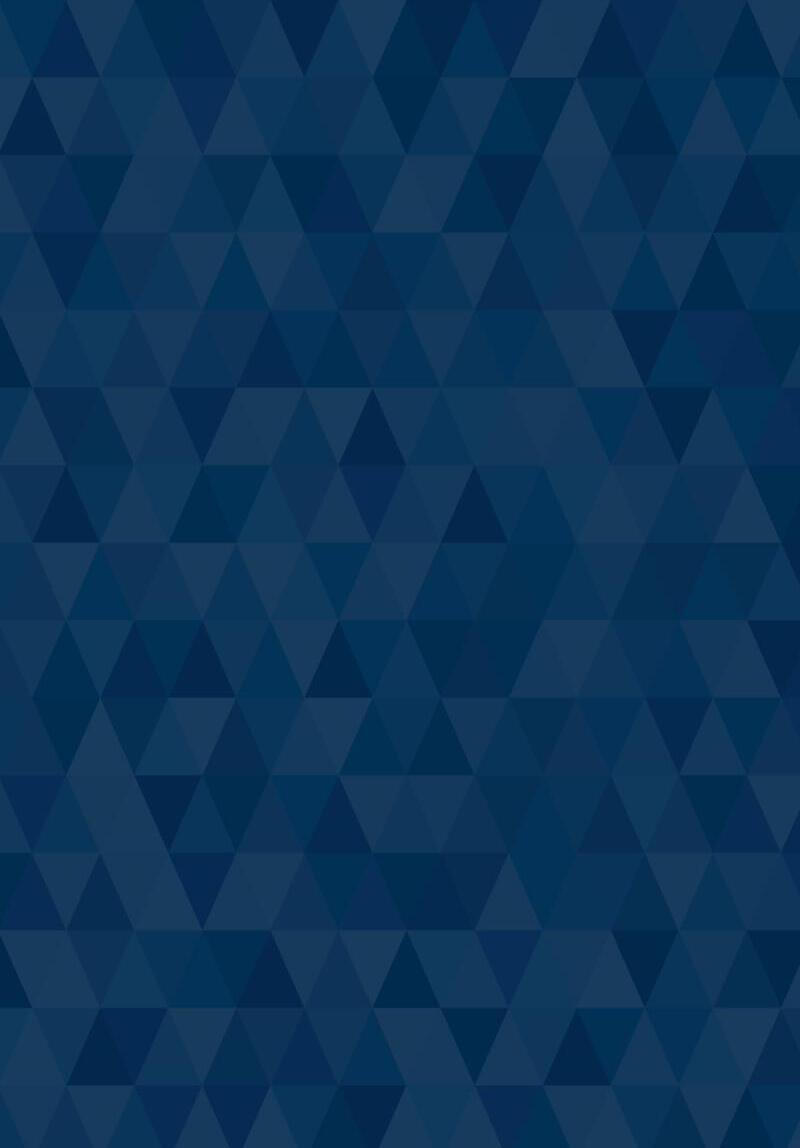
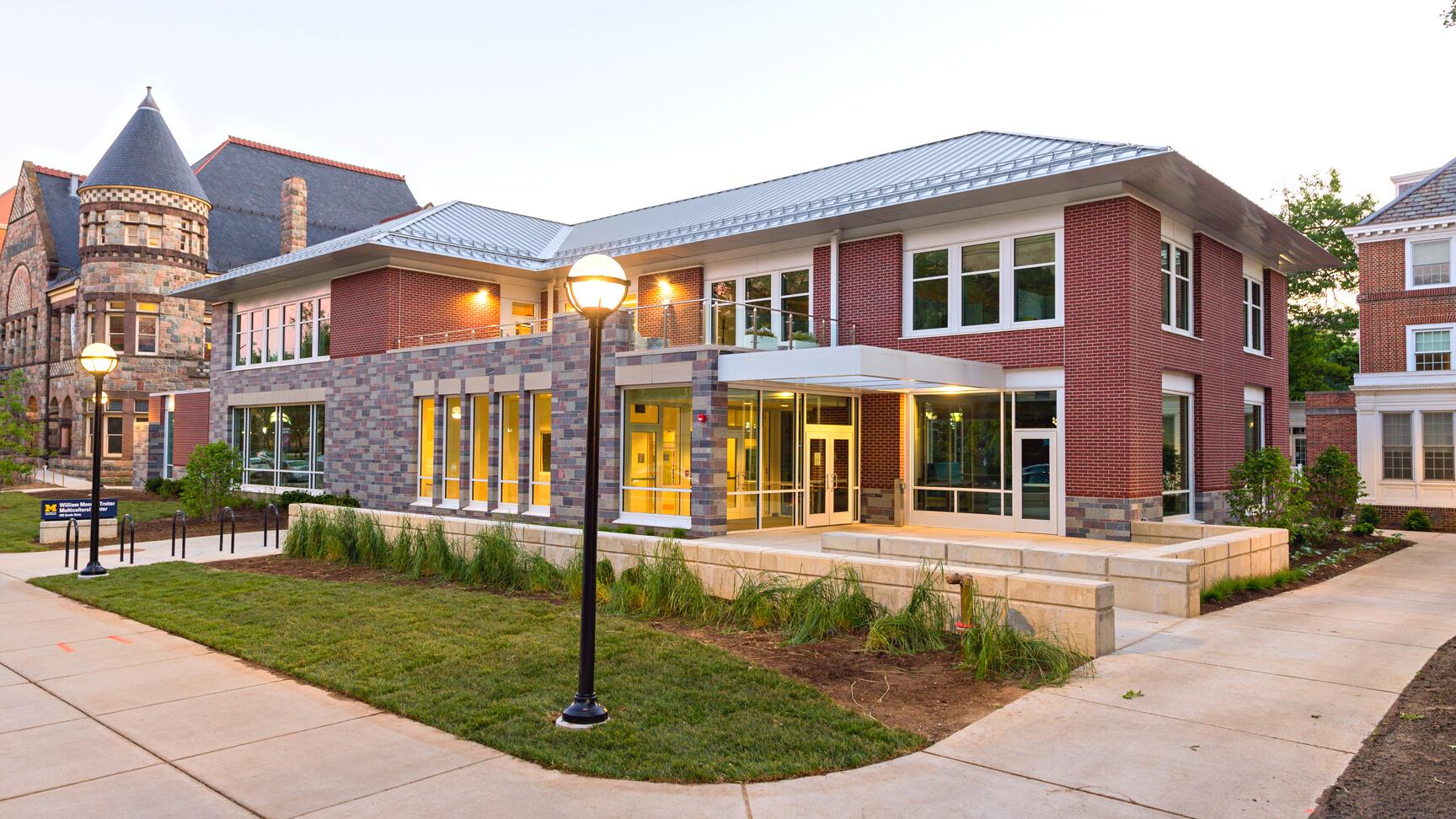

*Click the above graphic to learn more


The Trotter Multicultural Center underwent a transformative year of introspection and evolution in terms of our staffing model and organizational culture. As a result, we successfully established four new positions: Senior Manager-Hope, Healing, and Heritage; Operations and Engagement Manager; Administrative Coordinator; and Communications Specialist.
This restructuring effort also involves a collaborative position shared with the Ginsberg Center and the removal of one full-time role to establish a combined role dedicated to driving innovative programming for a larger and more diverse audience. The objective behind these changes is to enhance Trotter's ability to manage its programs effectively while embracing a broader scope of engagement.
During this year, three positions within the center remained vacant. Despite these staffing transitions, we have remained committed to prioritizing community building, supporting student advocacy and wellbeing and fostering intercultural development.
As in years past, we relied heavily on our fantastic student staff team to ensure the center runs smoothly and efficiently in its day-to-day operations. We employed 36 students across multiple positions to support facility needs, event management, programming and more. Our student staff are also an imperative part of building our culture and community within the Center. Our students truly make Trotter the home away from home that many students describe.
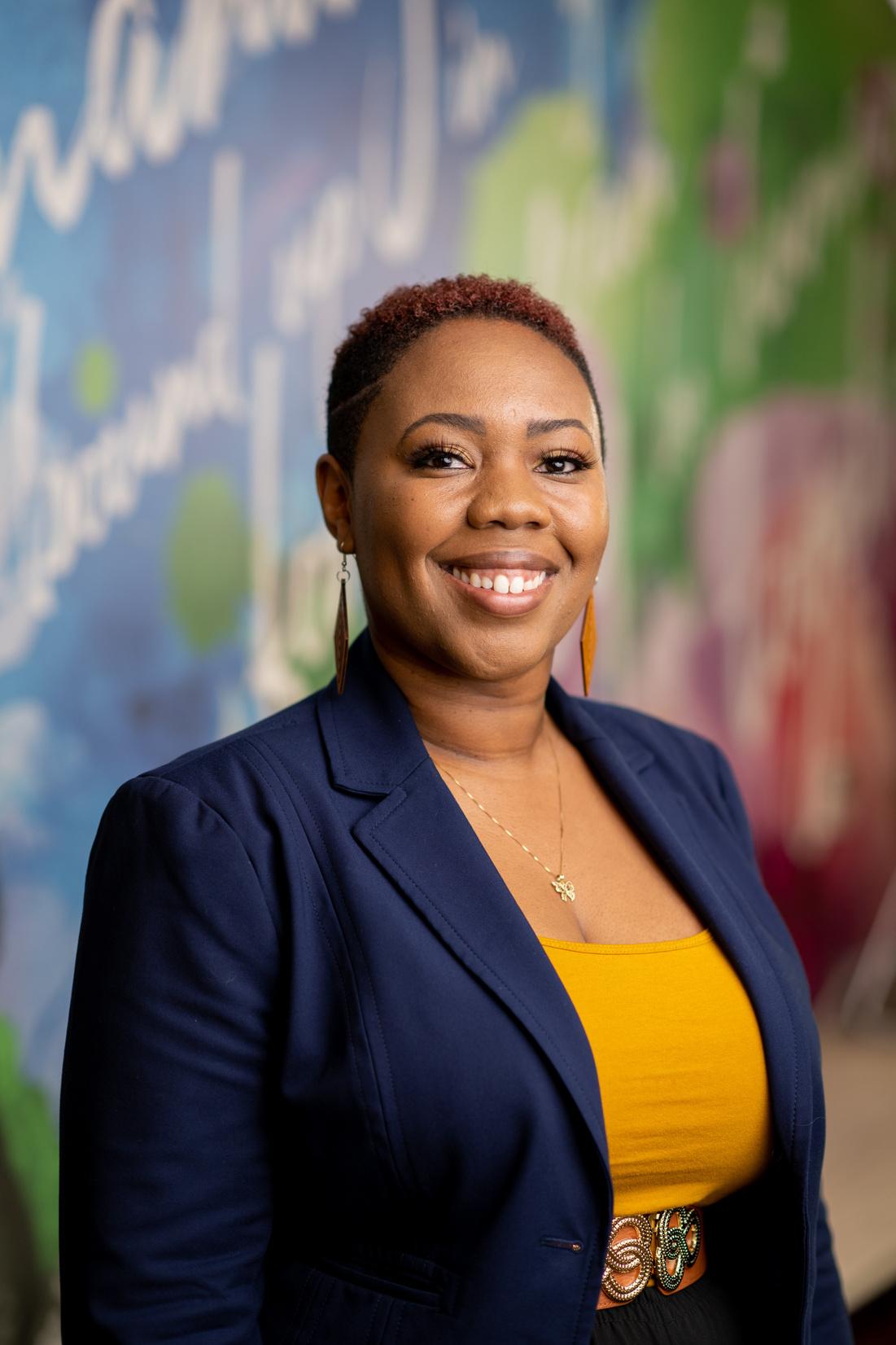


As of June 30, 2023
Director K Y R A S H A H I D
KELLYN MACKERL
COOPER
Associate Director
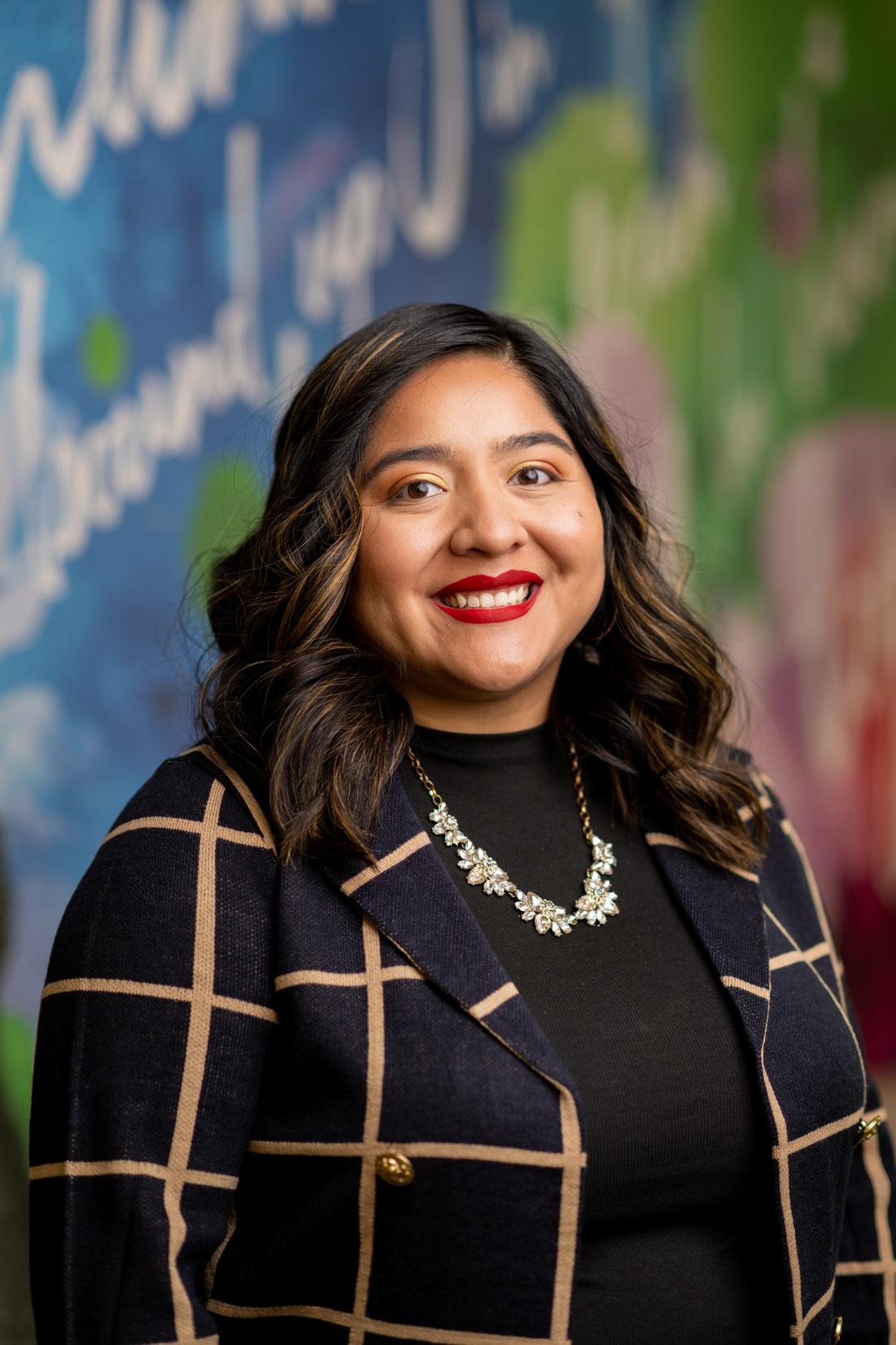
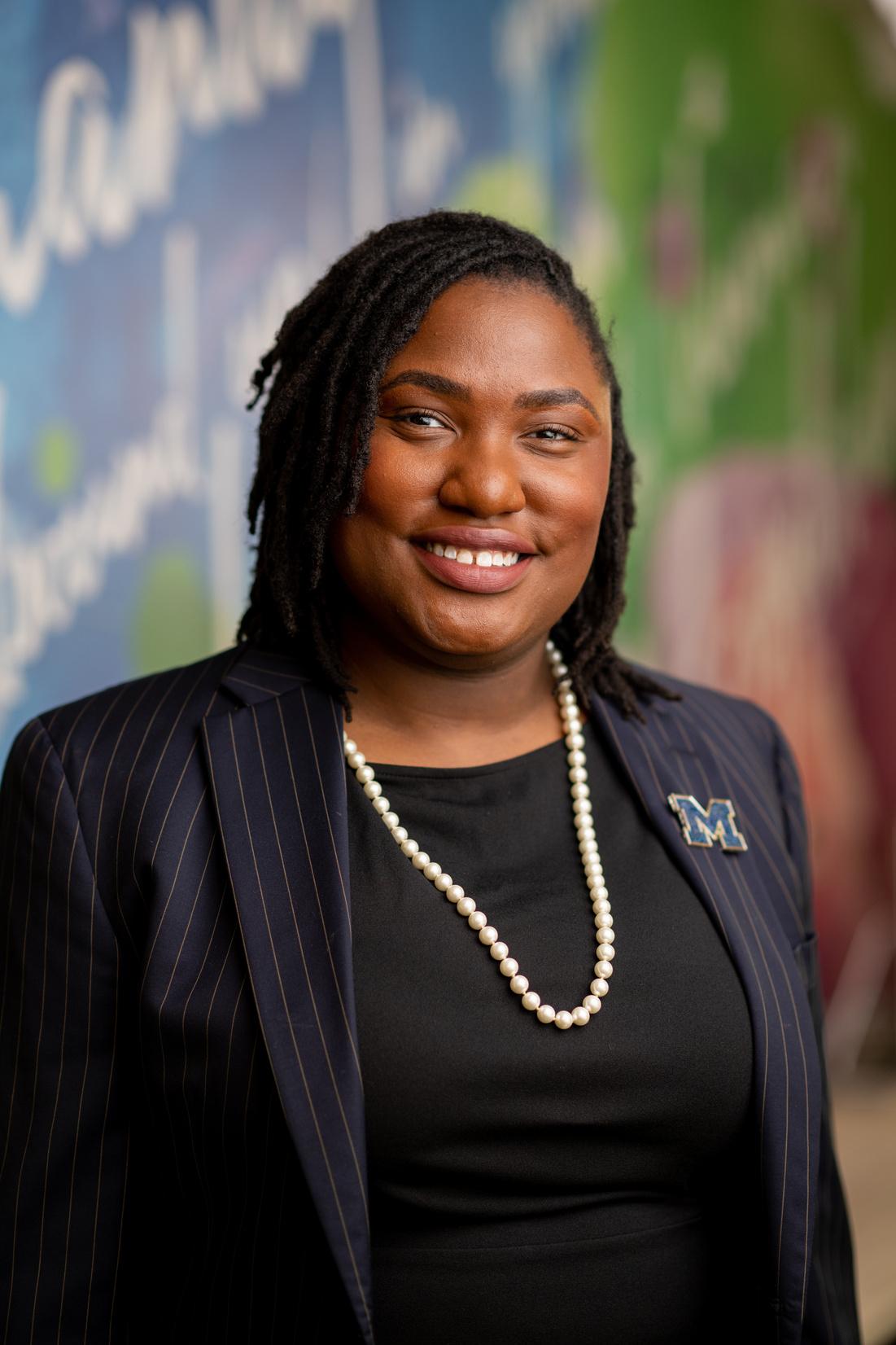
MARICELLA REYES
Program Manager
EVELYN METRIC
Communications Specialist
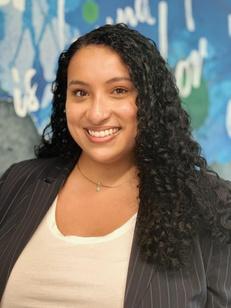
Farewell and thank you to these staff members who left our team this year:
Erica Amadi, Administrative Assistant
Nathan Hanke, Intercultural Learning and Innovation Lead
Brennan McBeth, Program Manager
Gregory Watson, Building Operations Supervisor

Trotter Multicultural Center’s facility and program operations are supported by the work of graduate and undergraduate student staff members From managing front-desk operations, to event setups, to program support, our student staff team members are at the core of the Trotter experience for our visitors.


Building Managers (BM): Provides front line guest services at the information desk, executes room set ups, provides A/V support for room reservations
Building Managers Team Leads: Expansion of the BM role. Additional responsibilities include peer supervision of 3-5 BMs and planning and delivery of student staff training.
Programming Assistant (PA): Supports one or more of the programming areas in planning, implementation and evaluation of events, and workshops. Additional roles have developed to provide specialized support including PAs for:
Graphic Design
Social Media & Marketing
Video Design and Editing


The Trotter Multicultural Center building is central to everything we do. It is vital that we cultivate a physical environment that contributes to an authentic sense of belonging. In addition to our own programming and events, our building hosts academic classes and events from within the U-M community throughout the year. This academic year, we held 13 classes and hosted over 300 events.
The cultivation and maintenance of our facility is a primary contributor to a sense of belonging for Black students specifically, students of color generally, and all U-M students broadly One of our top accomplishments in this area involved two permanent installations within the building. The first installation is an acknowledgment statement addressing the impact of Black student activism on the naming and creation of the Trotter Multicultural Center. The second installation is the only permanent internal mural completed by artist Tatayana Fazlalizadeh through the To Be Heard project in partnership with the Department of Humanities.
We also renovated our kitchen space in response to student needs and installed artwork, plant life and other materials to improve the feeling of hospitality in the building. We will continue to improve and bolster our building as different needs emerge and as we proactively anticipate the needs of our community.
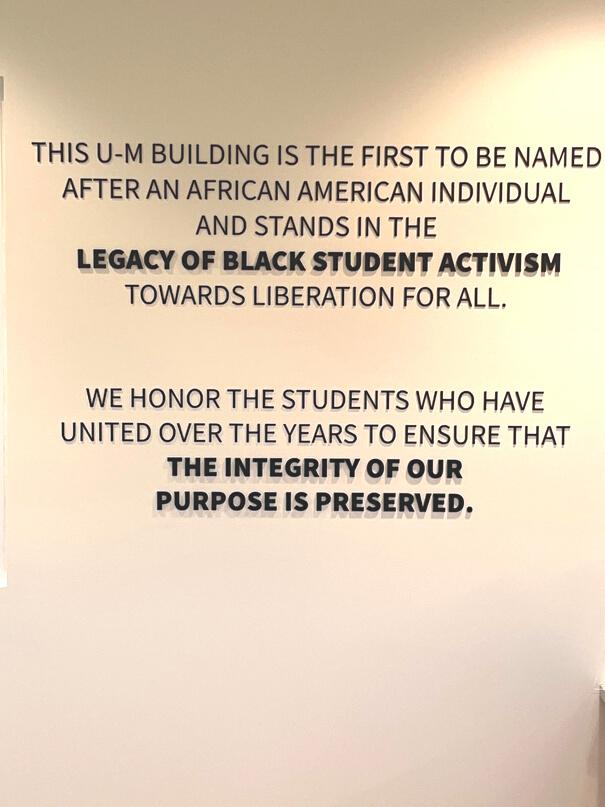
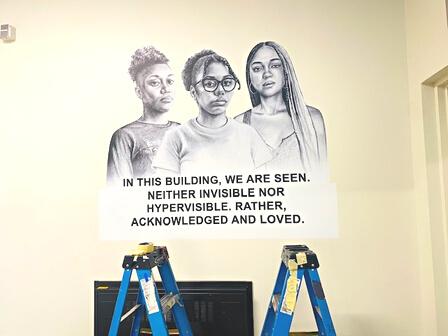
95,427 331 EVENTS HELD
TOTAL VISITS
HOURS OF OPERATION:
ACADEMIC YEAR 2022-2023
Weekdays: 8:00 A.M. to Midnight
W k d 10 00 A M Mid i h
During this academic year, Trotter Multicultural Center received 431 requests for room space for different events. However, we were only able to accommodate 331 of those events. Trotter’s space continues to be in high demand, and we prioritize events that are aligned with our mission. To ensure the availability of space for programs that further our mission, we created a process for organizations to share how their event furthers our work of:
Strengthening relationships
Generating collective power that disrupts patterns of inequity
Restoring & celebrating cultural heritages
Cultivating racial healing


Trotter Multicultural Center hosts several academic classes within the building. We ensure that the curriculum of these courses aligns with both the mission and vision of the Center. We held eight classes in Fall 2022 and five classes in Winter 2023.





Trotter offers programming in a multitude of areas, including wellness, community building, intercultural and interfaith efforts and civic engagement. The many structural and organizational changes the Center saw this year prompted us to deeply consider our programming and reassess its efficacy in meeting student needs as well as how well our programs align with our mission.
These conversations led our team to the decision that we need to enhance our programmatic offerings to better meet the needs of our current students. To achieve this, we began utilizing a traumainformed approach to assess how our program objectives align with our core areas of work. This approach ensures that we deepen the impact of the experiences we provide to students, both during their initial engagement and beyond.
During this year, our team launched two new programming series F.A.M. Fridays and CommuniTEA. In addition to our programming that focuses on areas such as wellness and racial healing, we wanted to offer students more opportunities to connect with each other and build relationships. We also wanted to encourage our professional staff to engage with students more and establish connections with them so that we can better understand what students want and need from the Center.
Our efforts to reimagine our programmatic offerings will continue into the next year, and we are excited to see the results of our commitment and dedication to our students and mission.
During the 2022-2023 year, we began to assess the impact of our existing programs and introduced two new series: F.A.M. Fridays and CommuniTEA. All of our programming continued to further intercultural/multicultural engagement, transformative development and promote well-being amongst students.
Trotter Multicultural Center’s programs and workshops focus on intercultural learning and development; intersections of interfaith and identity; wellness; civic engagement; cultural practices; and community building. Our program series include:

Soul Glow
F.A.M. Fridays
Trotter Distinguished Leadership Series (TDLS)




How to Flourish is presented in partnership with the Department of Afroamerican and African Studies and the LEAD Scholars Program.
Flourish programs focus on many dimensions of wellness through the lens of personal and social identities. Using the University Health Service, Wolverine Wellness Student Well-being model, our events discuss the importance of holistic well-being in interactive programs. This year, we hosted 8 events in this series.
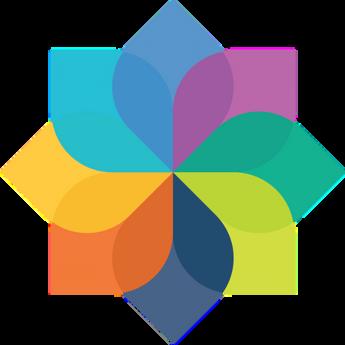
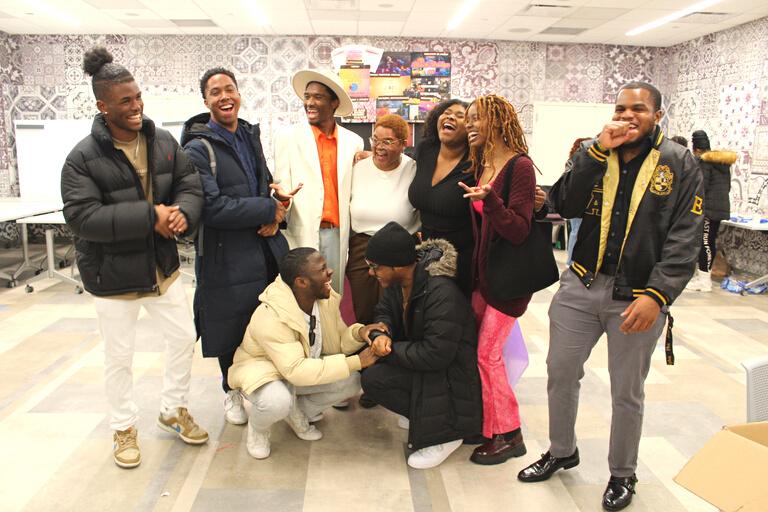
WORKSHOPS
HOSTED:
WORKSHOPS HOSTED:
Academic Wellness
Financial Wellness
Spiritual Wellness
Emotional Wellness

Growing in Community
Feeding the Soul
Planting Your Intentions
Acing the Interview



Launched this year, CommuniTEA is a weekly tea gathering for students, staff and faculty to build community and share information about what they are experiencing during the week. Organizations and units are encouraged to collaborate and offer light refreshments or share tea practices that center their cultural practices.
F.A.M. Fridays is a throwback program series that was relaunched to celebrate culture through Food, Art & Music. On the second Friday of each month, we explore the different cultural foods our campus community and the larger Ann Arbor community has to offer. The series also showcases student creativity in art and music and seeks to amplify student voices from marginalized communities and build community through cultural exchange.
HIGHLIGHTS: HIGHLIGHTS:
7 events held 6 cultural restaurants hosted 4 student organization collaborations
13 U-M student artists/creators featured
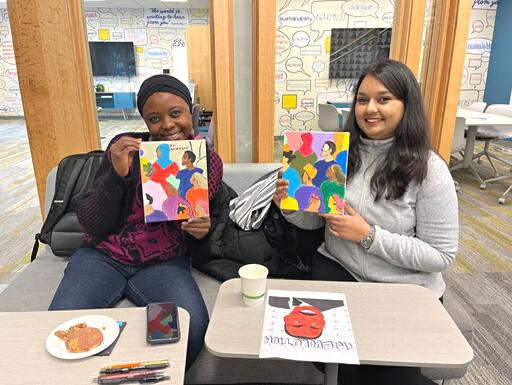
TDLS is designed to increase healthy discourse and learning throughout U-M by inviting speakers from the political and public service sectors of national and international note. Our goal is to bring together bright minds with talks that are idea-focused on a wide range of subjects to foster wonder and provoke conversations that matter to students.
1.
DEMOCRACY & DEBATE
PRESENTERS:
1. 2.
PURVI PATEL, DIRECTOR FOR CAMPUS & CIVIC ENGAGEMENT, UNIVERSITY OF CHICAGO’S INSTITUTE OF POLITICS
REV. NELSON PIERCE, JR., GRASSROOTS POWER BUILDER, DEMOCRACY FOR AMERICA
MODERATOR: NEERAJA ARAVAMUDAN, DIRECTOR, EDWARD GINSBERG CENTER AT UNIVERSITY OF MICHIGAN


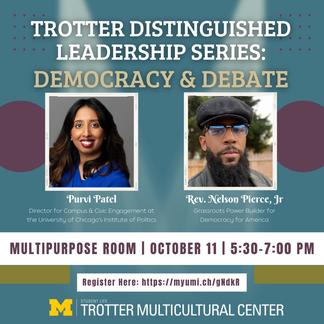
PRESENTERS:
1 2 3
DR. SILVIA PEDRAZA, PROFESSOR OF SOCIOLOGY AND AMERICAN CULTURE, UNIVERSITY OF MICHIGAN REBECA ONTIVEROS-CHAVEZ, MANAGING ATTORNEY, MICHIGAN IMMIGRANT RIGHTS CENTER
MELANIE GRUND, SENIOR ADVISOR ON IMMIGRANT AFFAIRS, FOOD SECURITY, AND HOUSING, OAKLAND EXECUTIVE
MODERATOR: RONNIE RIOS, DOCTORAL CANDIDATE, HIGHER EDUCATION PROGRAM AT UNIVERSITY OF MICHIGAN
3. POWER TO THE STUDENTS: THE IMPACT OF ACTIVISM AT U-M
PRESENTERS: 1. 2.
JON CURTISS, FIELD REPRESENTATIVE & ORGANIZER, AMERICAN FEDERATION OF TEACHERS
DR. CHARLES H.F. DAVIS III, ASSISTANT PROFESSOR, CENTER FOR THE STUDY OF HIGHER & POSTSECONDARY EDUCATION, DIRECTOR, CAMPUS ABOLITION RESEARCH LAB, UNIVERSITY OF MICHIGAN
MODERATOR: DR. KYRA SHAHID, DIRECTOR, TROTTER MULTICULTURAL CENTER AT UNIVERSITY OF MICHIGAN

16
521
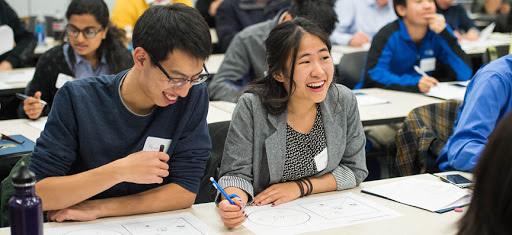
At Trotter we facilitate workshops for student staff teams and classes, featuring content and tools including the Intercultural Development Inventory (IDI), Intercultural Conflict Styles Inventory (ICS), etc. Our workshops encourage global and inclusive mindsets as a strategy to effectively engage across differences.
187

8

5
4
Barger Leadership Institute, Leadership Certificate College of Engineering: M-STEM Summer Bridge Program M-ENGN & M-SCI ENGR 260 Class
Ross School of Business Student DEI Chairs
Penny W. Stamps School of Art & Design: ARTDES 434 Course
School of Nursing: N 373 Course
School of Public Health: EPID 603
School of Kinesiology

Trotter Multicultural Center aims to create a safe and warm environment for the students we serve. Here is why our students love Trotter:
“I come to Trotter because it feels really safe and comfortable, and I like being around people of my community.”

“I come to Trotter to see people who look like me, but also to have camaraderie and fun while also having a place to do work.”
“I have the ability to be in my own space but also be around community, so I’m able to balance the two. It’s a home.”
“It’s one of the only places on campus where I can really feel comfortable and not alienated. It’s really important to our community.”
Trotter serves not only individual students, but also student organizations. Learn more about why students and their organizations love Trotter: We use Trotter as a safe space to hold a wide range of events, from workshops to socials. Members of our organization also frequently use Trotter as a place to study or to hang out and destress.
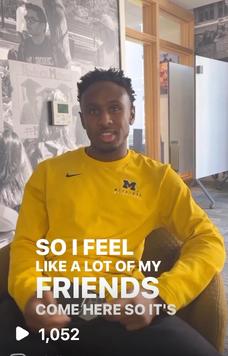

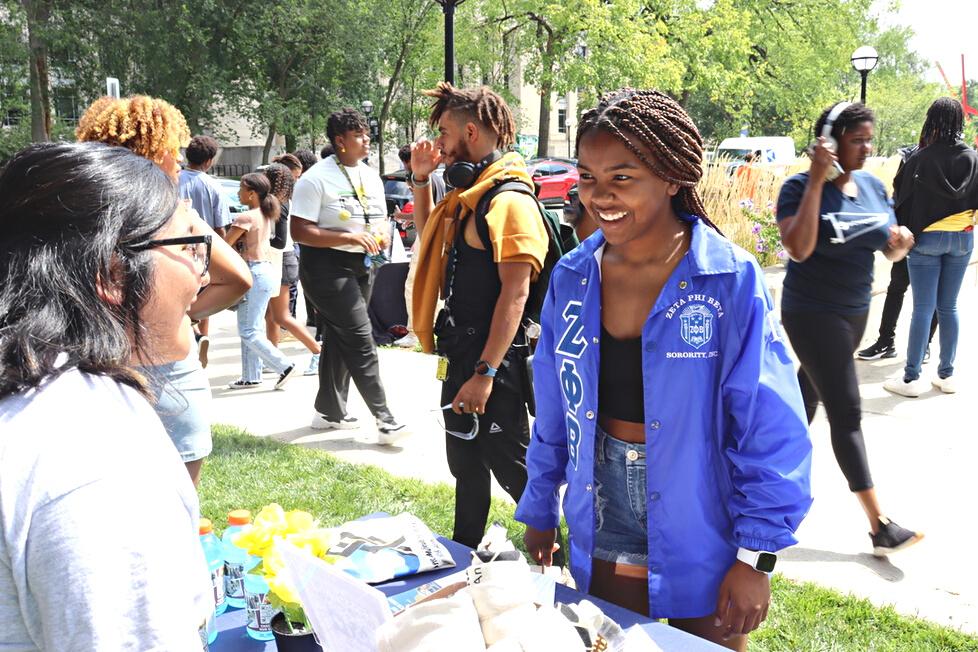
-Arab Student Association
Our weekly hangouts are held at Trotter. The spaces are always clean and the staff are always helpful. We love having events and meetings here.
-Native American Student Association


As we turn the page to the next year and beyond, Trotter Multicultural Center has much to look forward to. At the beginning of this academic year, we launched a Transforming Trotter strategic plan which involved a critical review of our programming, physical space and organizational structure.
Our internal review of programs and workshops led to the sunsetting of many initiatives, most notably Intercultural Development Inventory (IDI) training and support. As part of our ongoing commitment to fostering a more inclusive and equitable campus environment, we are redesigning our approach to intercultural learning and development.
While the IDI has served as a valuable tool in the past, we recognize that it is essential for Trotter Multicultural Center to evolve and adapt in response to the ever-changing landscape of campus. As we embark on this transition, we remain dedicated to implementing more holistic, culturally responsive and sustainable programming that reflects the diverse needs of our campus community.
We are also revamping many of our other program series and redesigning our learning curriculum, including deepening and expanding partnerships with faculty who teach courses in Trotter. This undertaking will help us build strategic academic partnerships that further our commitment to dismantling patterns of inequity in higher education. Transforming Trotter also included actions in response to student requests for certain spaces to be revamped and improved to better fit their needs, including access to additional outlets, adding vending machines and renovation of our kitchen space. Facility improvements will continue as we look to deepen our approach to hospitality and improve the usage of spaces within the building.

Our next projects include the installation of an intercom system for building communication, updates to building technology and updates to the professional staff office suite. Our aim is to increase meeting space and create a more collaborative and functional workspace. This renovation will involve the creation of two private office spaces, a conference room and more accessible workstations with dedicated spaces for meetings with students This is particularly significant as the current office space consists of 12 short-wall cubicles with no access to private meeting areas.
In addition to facility transformations, Transforming Trotter strategic planning also includes significant organizational and staffing changes that are currently underway. The changes in staffing included the creation of several new positions including a Communications Specialist, and Senior Manager for Hope, Healing, and Heritage and restructured positions that previously existed.

Our next phase of transformation involves strengthening student engagement and input through an ambassador program, establishing a council of elders and launching new initiatives for sustained learning and engagement.
We are eager to see what the year ahead brings, and we will continue to be a space that our students can turn to to find and experience community.


